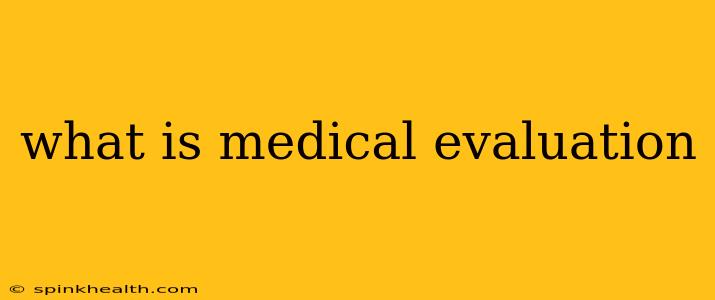What is a Medical Evaluation? Unraveling the Mysteries of the Doctor's Visit
Imagine this: you walk into a doctor's office, a little nervous, maybe with a nagging cough or a persistent headache. What happens next? That's where the medical evaluation comes in. It's the cornerstone of healthcare, a systematic process that helps doctors understand your health and figure out how to best help you. It's much more than just a quick check-up; it's a story, your story, told through symptoms, medical history, and physical examination.
This isn't just about diagnosing a single problem; it's about getting a comprehensive picture of your overall health. Think of it as a detective investigating a case, but the case is you.
What does a medical evaluation typically involve?
A typical medical evaluation involves several key components, often interwoven and building upon each other:
1. Taking a Detailed Medical History: The Foundation of Understanding
This is where the doctor gets to know you. They'll ask about your current symptoms – when they started, how severe they are, and anything that seems to make them better or worse. This is crucial because symptoms, often subtle, can provide invaluable clues. They'll also delve into your past medical history, including any previous illnesses, surgeries, allergies, and medications. Your family history of illnesses is also significant, as it provides context for potential genetic predispositions. Think of it as building the foundation for your health story.
2. The Physical Examination: A Hands-On Approach
Next comes the physical examination, where the doctor uses their senses and instruments to assess your body's condition. This can include listening to your heart and lungs with a stethoscope, checking your reflexes, feeling your abdomen, and examining your skin. The specifics will vary based on your symptoms and overall health, but the goal remains the same: to gather objective data that complements the subjective information from your medical history.
3. Diagnostic Testing: Seeking Deeper Answers
Sometimes, the information gathered during the history and physical examination isn't enough. This is where diagnostic testing comes in. These could range from simple blood tests to more complex imaging studies like X-rays or MRIs. These tests help doctors confirm or rule out certain diagnoses, providing a clearer picture of your health status.
What are the different types of medical evaluations?
The type of medical evaluation you undergo depends heavily on the situation:
- Routine Check-up: A preventative visit focusing on overall health, including screenings and vaccinations.
- Sick Visit: When you are experiencing symptoms of an illness or injury.
- Follow-up Visit: Monitoring progress after treatment for a previous condition.
- Specialized Evaluation: Performed by specialists, such as cardiologists or dermatologists, focusing on specific areas of concern.
What is the purpose of a medical evaluation?
The primary purpose of a medical evaluation is to:
- Identify and Diagnose Medical Conditions: Pinpoint the cause of your symptoms.
- Develop a Treatment Plan: Outline the best course of action for your health.
- Monitor Your Health: Track the progression of a condition or the effectiveness of treatment.
- Promote Preventative Care: Identify risks and recommend strategies to improve your health.
How long does a medical evaluation take?
The duration of a medical evaluation can vary significantly depending on its complexity. A routine check-up might take 15-30 minutes, while a more comprehensive evaluation could take an hour or longer.
How much does a medical evaluation cost?
The cost of a medical evaluation depends on many factors, including the type of evaluation, the location, your insurance coverage, and the provider.
A medical evaluation is a dynamic and crucial part of healthcare. It's a collaborative process, involving your active participation, where the doctor's expertise is combined with your personal health story to create a clear path towards better health. It's not just about fixing problems; it's about understanding and improving your overall well-being.

